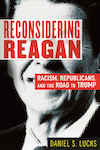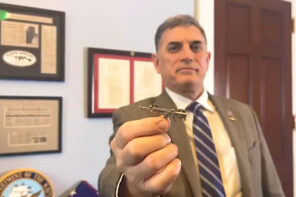Thirty-five years before Donald Trump descended the escalator of his gaudy Manhattan skyscraper to launch his presidential run by way of a racist attack on Mexicans—“they’re bringing drugs, they’re bringing crime, they’re rapists,” he raged—another presidential aspirant traveled to the heart of Mississippi to tell an all-white crowd that he supported states’ rights, a well-acknowledged racist dog whistle.

Reconsidering Reagan: Racism, Republicans and the Road to Trump
Daniel S. Lucks
Beacon Press
August 4, 2020
With the rise of Donald Trump, a bold and brash racist who hasn’t dog-whistled to white nationalism so much as he’s supplied it with a megaphone, Reagan, like other recent Republican presidents, especially George W. Bush, has benefitted from a historical nostalgia that imagines a kinder, gentler GOP in the modern era, particularly on matters of race.
In this telling, Trump is an aberration of the American presidency and an apostate of traditional conservatism. Mythmaking of Reagan by #NeverTrump Republicans, and even some liberals, since 2016 has abetted this narrative, emphasizing Reagan’s soft(er) stance on immigration, his sunny disposition, and his “big tent” Republicanism as a counterpoint to the crude and callous Trump and the awful viciousness he’s unleashed from the Oval Office and throughout today’s GOP.
Yet in his new book, Reconsidering Reagan: Racism, Republicans and the Road to Trump, Daniel S. Lucks argues instead for understanding Trump not as exceptional, but as a “culmination of where the Republican Party and the conservative movement have gone since Goldwater’s nomination in 1964, the year Reagan launched his political career.”
Considering all the ways that Reagan has been considered, it may seem there aren’t many ways left to reconsider the 40th president. But Lucks notes that of the hundreds of books written on him, none has focused entirely on Reagan and race. That lacuna in the literature certainly warrants Lucks’ thorough and deeply-researched study, and his book should be read by all scholars of Reagan and modern conservatism.
Trained as both a lawyer and historian, Lucks steadily builds his case with both a prosecutor’s zeal and a scholar’s fine eye for evidence, causation, and context. Some readers may wonder, though, if this re-telling of Reagan’s biography also warrants its bold subtitle, “Racism, Republicans, and the Road to Trump,” and whether we may be reading Trump back into the past more than simply tracing the contours of history towards today.
To his great credit, Lucks doesn’t overwork this angle. Other than in his introduction and the final chapter, “Reagan’s Racial Legacy and the Road to Trump,” Lucks draws no direct connections between Reagan and Trump in the body of the book. Instead, he lets the parallels progressively accumulate in the reader’s mind.
This restraint benefits Reconstructing Reagan, keeping it a work of sober scholarship rather than letting it slip into scurrilous screed. And anyone with a glancing familiarity with Trump’s racism shouldn’t need the lines to be explicitly drawn. Reagan’s public sparring with the Black Panther Party while governor of California; his comment to Richard Nixon that Black African diplomats were “monkeys” who were “uncomfortable wearing shoes”; his courting of white Southerners in his presidential runs; his frequent fabrications of both an African-American “welfare queen” in Chicago and of his own past as a civil rights crusader; his visit to the “historically racist” Bob Jones University while it was still under federal investigation for policies against interracial dating; his cozying up to senators Strom Thurmond and Jesse Helms—these are just a few examples that draw to mind their Trumpian analogues of birtherism, “shithole countries,” Jeff Sessions, “very fine people,” attacks against Black Lives Matter, the defense of Confederate monuments, and the constant assertion that he’s been the best president ever for African Americans.
Lucks’ discussion of religion will likely be of great interest to readers of RD. Reagan’s mother, Nelle, was a devout Christian and active in her Disciples of Christ church, a denomination with a history in the abolitionist movement. Nelle had even delivered a talk to her Sunday school class in 1928 on “Negro Disciples and Their Contribution,” and she and her husband, Jack, a lapsed Catholic who struggled with alcoholism, raised Reagan and his brother, Neil, in what Lucks describes as a racially-progressive home at the time.
Reagan would tout that upbringing against accusations of racism he later faced in his political career, but as Reagan moved to the right politically—his parents were staunch Democrats and he had been a Roosevelt Democrat before eventually switching parties—the white Southern evangelicals who became essential to his national success in 1980 appreciated the anti-welfare, anti-civil rights legislation, and “law and order” politics that Reagan had spent nearly two decades advancing.
As the historian Randall Balmer has argued, race may have provoked the rise of the religious right in the 1970s more than abortion. White Southern evangelicals’ opposition to civil rights and their growing anger at the IRS’ decision to remove tax exemptions for segregated private Christian schools aligned neatly with Reagan’s policies. In the White House, Reagan’s staunch anti-communism and his expressed, if inactive, support for religious conservatives’ social issues, including opposing abortion and gay rights, helped strengthen the bond. His anti-affirmative action and “War on Drugs” policies, couched in the language of “fairness” and “safety,” provided a more socially-acceptable agenda than the Jim Crow laws of the past, especially for the ascendant white evangelicals of the Sun Belt, but they had devastating consequences for Black and Brown communities throughout the nation.
While an inconsistent churchgoer, Reagan’s personal faith seems to have been closely held throughout his life, and he was well-versed in the Bible, a marked contrast from Trump. Reagan had a deep, perhaps even delusional, sense that he had been chosen by God to be president, a conviction that drove his multiple bids for the White House and that shaped his own sense of his presidency. Trump shares those delusions, although not the depth, but it may matter more that his supporters seem far more fanatical about his supposed righteous calling than Reagan’s backers ever were.
Reconsidering Reagan’s record on race certainly provides important insight to the Trump presidency. We might also consider how Trump’s expansive racism—one directed at Blacks, immigrants, Muslims, and more—has been embraced so widely by white evangelicals. If Reagan was once their hero, Trump is now being heralded by many as their political savior. That’s something that even Reagan would never have wanted.





